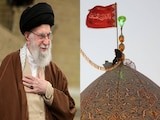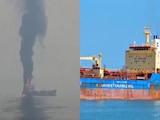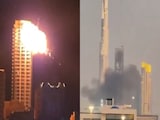- PM Modi met Xi Jinping on the sidelines of the SCO summit in Tianjin, China
- He said he is "committed" to taking India-China ties "forward based on mutual trust, respect and sensitivity"
- He also highlighted the resumption of Kailash Mansarovar Yatra and direct flights with China
Prime Minister Narendra Modi on Sunday met Chinese President Xi Jinping and said he is "committed" to taking India-China relations "forward based on mutual trust, respect and sensitivity".
During a meeting with Mr Xi on the sidelines of the two-day Shanghai Cooperation Organisation (SCO) summit in China's Tianjin, PM Modi also said an "atmosphere of peace and stability" has been created after the disengagement on the border.
"I sincerely thank you for the warm welcome. Last year, we had a very meaningful discussion in Kazan, which gave a positive direction to our relations," he said in his opening remarks, referring to the meeting between the two leaders in Russia on the sidelines of the BRICS summit in October 2024.
"An atmosphere of peace and stability has been established after disengagement at the border. Our Special Representatives have reached an understanding on border management," PM Modi said.
PM Modi also spoke about the resumption of the Kailash Mansarovar Yatra and direct flights between the two countries.
"The cooperation between us is linked to the interests of 2.8 billion people of our two nations. This will also pave the way for the welfare of all humanity. We are committed to further strengthening our relations on the basis of mutual trust, respect, and sensitivity," he said.
Mr Xi said it is important for India and China to be "friends and good neighbours".
"It is a great pleasure to meet you again, Mr Prime Minister. I welcome you to China for the SCO summit. Last year, we had a successful meeting in Kazan. We are the world's two most populous countries, and we are also important members of the Global South. We both shoulder the historical responsibility of improving the well-being of our two peoples, promoting the solidarity and rejuvenation of developing countries, and promoting the progress of human society," he said.
"It is the right choice for both countries to be friends who have good neighbourly and amicable ties, partners who enable each other's success, and to have the dragon and the elephant come together," Mr Xi said.
The Chinese President said both countries need to "handle our relationship" from a strategic and long-term perspective.
"We must also step up to our historic responsibilities to uphold multilateralism, a multipolar world, and more democracy in international institutions and work together for peace and prosperity in Asia and around the world," he said.
This is PM Modi's first visit to China in seven years and comes amid a strain in India-US ties triggered by President Donald Trump's 50 per cent tariffs on Indian goods, including 25 per cent duties for purchasing Russian crude oil.
India-China Ties
The relations between India and China nosedived following the deadly clashes between their soldiers in the Galwan Valley in eastern Ladakh in June 2020.
After several rounds of high-level talks, the two sides completed the disengagement process from the last two friction points of Demchok and Depsang under an agreement finalised in October 2024.
PM Modi's trip to China comes nearly two weeks after Chinese Foreign Minister Wang Yi visited India.
During his two-day visit, Mr Wang held talks with External Affairs Minister S Jaishankar and National Security Advisor Ajit Doval for a "stable, cooperative and forward-looking" relationship between the two countries.
SCO Summit In China
Twenty foreign leaders are attending the SCO Plus summit, which China is hosting this year as the rotating chair of the 10-member bloc.
The event, which will also see the participation of Russian President Vladimir Putin, is the largest gathering since the group was established in 2001 among six Eurasian nations.
Besides China, India and Russia, the group comprises Iran, Kazakhstan, Kyrgyzstan, Pakistan, Tajikistan, Uzbekistan and Belarus.















